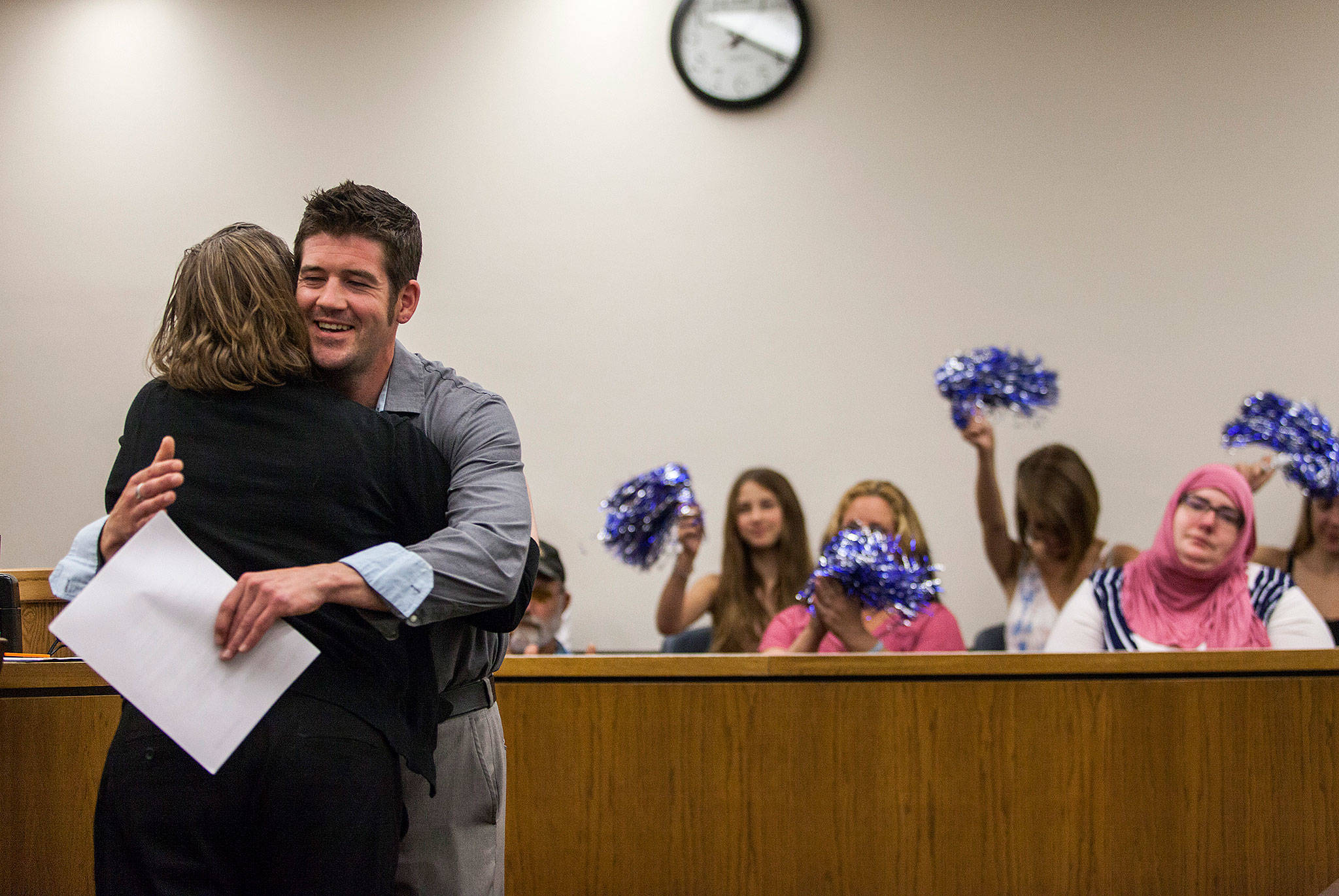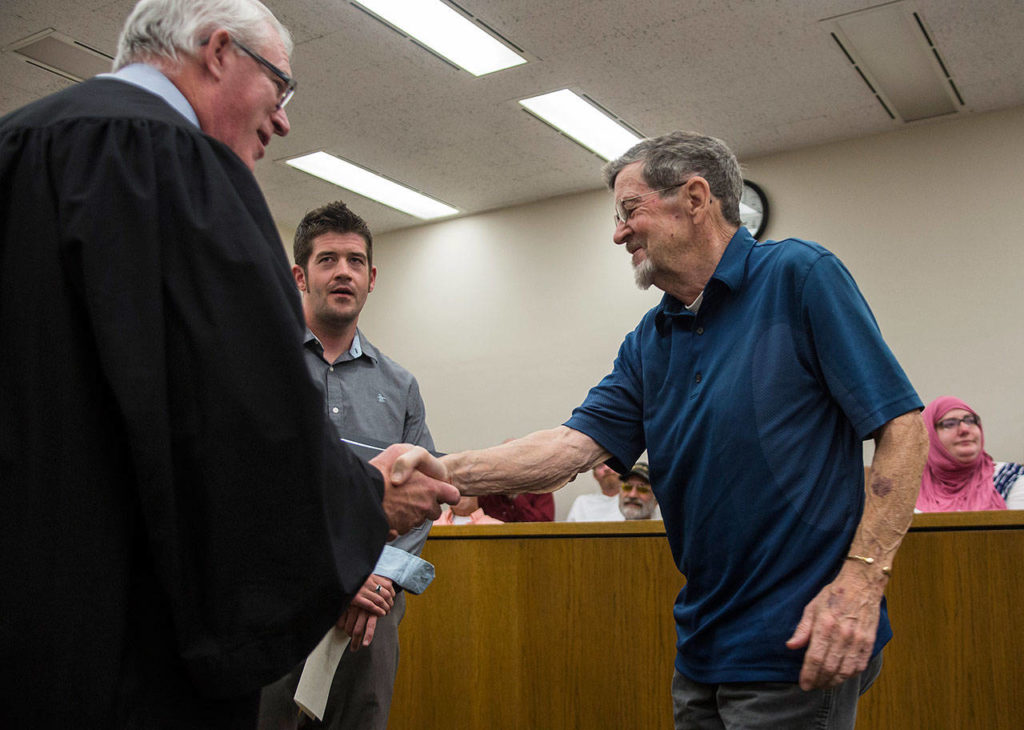EVERETT — Eric Brossard is celebrating his 633rd day clean.
It’s his graduation day at the Snohomish County’s drug court. The room is packed with friends, family and fellow addicts. A drug court alumna, Holli Casillas, sits with purple pom-poms beside Brossard’s family. She’s been to at least 200 other graduations to cheer on fellow addicts, she said.
Brossard’s father hands a certificate of completion to his son, and the courtroom erupts with applause.
“It’s like you’re a rock star,” Superior Court Judge Joe Wilson says.
Adult Drug Treatment Court offers addicts charged with nonviolent crimes a chance to get clean and avoid a felony mark on their records. The program includes drug treatment, support groups, random drug tests, court hearings and therapy. To graduate, recovering addicts must be employed and earn a GED, if they haven’t already.
Wilson has been the court’s judge for nearly five years. More than 150 people have graduated in his courtroom. In all, more than 800 have graduated since the court began in 1999.
Five years after admission, 87 percent of graduates are crime-free, according to county data.
For the court to succeed, not only do participants have to be honest with Judge Wilson — he has to be honest with them, he said.
“If you don’t have (honesty), the addicts will eat you alive,” the judge said. “They know dishonesty and lack of integrity. They’re the kings of it.”
The program aims to dig deep into what causes addicts to use, besides a chemical dependency. Drug use is a symptom of a personal struggle, Wilson said.
“It’s a different way to think about addiction,” he said. “It isn’t rocket science.”
Wilson said when he talks to addicts, it could be the first time a judge has had a personal conversation with them. That sets the court apart. He comes off the bench, shakes hands and hugs people. That level of engagement leaves him exhausted at the end of each week. But “being there with them as a fellow human being is the greatest honor of my life,” he said.
The drug court has an economic benefit as well, according to Snohomish County figures. For every dollar spent toward the program, an estimated $7 is saved on future arrests.
“I’d rather have someone in treatment than in prison,” Wilson said. “I think most people feel that way.”
On graduation days, cardboard posters hang on the courtroom wall. They’re collages of graduates. Each comes with a quote.
“Change your way of thinking to change your way of seeing,” one reads. “Seeing is believing and knowing it can happen.”
Nick Watts, 32, stands beside the judge in one photo. He was arrested about 15 times before being admitted into the program, he said. He graduated in November 2014. His years of addiction were fueled by meth, heroin, cocaine and Xanax.
“I was at a point in my life where I either wanted to die or make something change,” he said.
When he entered the program and met Judge Wilson, he was relieved. He said the judge could be stern, but always made him feel welcome.
“I like to say he ruled with a velvet hand and an iron hammer,” he said. “I never saw anyone get anything they didn’t deserve.”
Almost four years after his graduation, Watts’ life is busy and structured. He’s a barber at Jonn Laurenz Fine Cuts, just a block away from the courthouse. Watts said staying close serves as a reminder of where he could be.
These days he focuses on his children, 11 and 2, and helping those who struggled as he did. Graduates face the difficulty of acclimating to life without the court’s structure. Watts wants to start an alumni program through a phone tree.
Its main service would be to provide a listening ear, he said.
Watts is the vice president of Live 4 Purpose, a nonprofit whose members hand out food to the homeless near the Everett Gospel Mission every other Sunday. During the winter, the group donates backpacks filled with toothpaste, hand warmers and essentials. Last year they distributed 500. This winter, Watts said he hopes to give away 750.
Snohomish County’s drug court is one of 22 statewide.
“We have a lot of other courts come and watch us,” said Janelle Sgrignoli, administrator for the county’s specialized courts. “We’re probably one of the best in the state.”
Sgrignoli said she warns her staff they can’t save everyone. Not every participant graduates. Not all graduates are as successful as Watts.
“It’s up to them to make those choices,” she said. “But even if it’s just one that succeeds, it’s worth it.”
Failing to graduate doesn’t necessarily mean an addict is using drugs or committing crimes. They can be cut for missing court dates. Wilson said he has terminated people who come to him later with 300 days of sobriety.
County data shows the court can help even those who don’t graduate. Two-thirds of non-graduates have not been arrested for committing crimes five years after they were first admitted.
“We’ve already impacted them and their perception around drug use,” Sgrignoli said.
Wilson doesn’t believe in relapsing. Addicts who continued to use weren’t ready for the world outside, the judge said.
“I think they didn’t deal with the underlying issues,” he said. “There’s still something deeper.”
Joseph Thompson: 425-339-3430; jthompson @heraldnet.com. Twitter: @JoeyJThomp.
Talk to us
> Give us your news tips.
> Send us a letter to the editor.
> More Herald contact information.



























